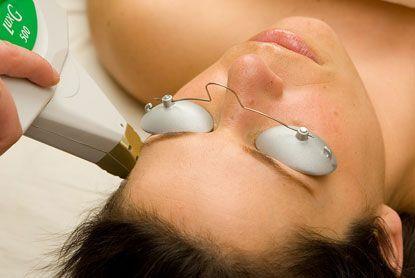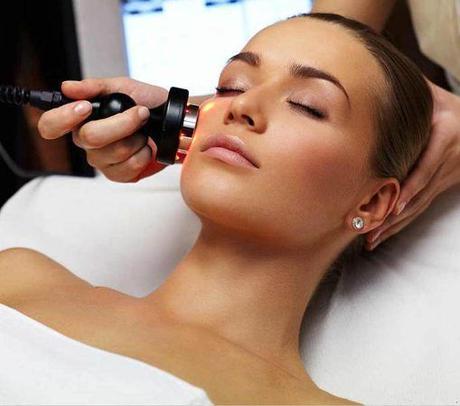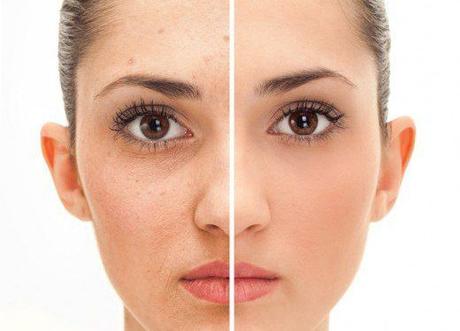As we get older, our bodies begin to gradually lose the collagen and elastin that is needed to keep our skin looking plump and smooth. Thanks to innovative cosmetic procedures, we now have the opportunity to maintain a youthful appearance as we age. Two popular anti-aging procedures are photofacials and laser therapy. Although both treatments can prevent and reverse signs of aging, they differ in several ways. If you understand what each treatment has to offer, it can help you decide which is best suited for your skin care needs.
What is a Photofacial?
A photofacial is a cosmetic procedure that treats the skin through a type of light-based technology. The primary purpose of a photofacial is to boost collagen, diminish discoloration, and treat broken capillaries. Photofacials can also be referred to as facial rejuvenation, foto facials, and photo rejuvenation.
IPL Photofacial 
An IPL photofacial can effectively treat brown spots, redness, and spider veins. This type of photofacial uses a powerful, bright flash of light that is delivered through a device that will be applied to the troubled areas. Although the device does have a cooling feature, the procedure can still cause slight discomfort. The procedure is convenient because it typically only takes a plastic surgeon 30 minutes to perform an IPL photofacial.
What are the Benefits of an IPL Photofacial?
This procedure can be beneficial if you want to achieve many different goals such as plump, youthful skin, diminished brown spots, a reduction in broken capillaries, and facial redness. Depending on your desired results, you may need several IPL photofacial treatments, and it will usually take several weeks before you notice significant results.
Who are Ideal Candidates for a Photofacial?
Those who have sun-damaged, blotchy, and discolored skin may benefit from an IPL photofacial. In addition, the treatment also works best for those who have untanned skin. If you have tanned skin, it is important to discuss possible side effects with an experienced plastic surgeon. Many individuals with freckles, large pores, or rosacea opt for IPL photofacials. However, those with deep acne scars or wrinkles may benefit from a more aggressive treatment.
What is the Recovery Time for a Photofacial?
There is minimal damage to the skin during a photofacial, so the recovery time is very short compared to other skin rejuvenation procedures. Redness is expected after the treatment, and the period of time the skin will remain red will vary based on an individual’s skin type. For most individuals, the side effects of a photofacial will diminish within a couple of hours. However, some individuals may have red or dark spots that last about a week. In addition, those with acne will typically experience a longer recovery time, but most individuals feel that the results are worth the wait.
Moreover, it is essential that you remain out of the sun for several days following the procedure. You should also wear sunblock daily to ensure the results of the procedure last. In most circumstances, the results of a photofacial treatment will last about one to two years, but the first couple of weeks following the procedure are crucial for optimal results.
What are Laser Skin Treatments?

Laser skin treatments are also referred to as laser skin resurfacing, a laser peel, lasabraision, and laser vaporization. Innovative technology used in laser skin treatments give a plastic surgeon the ability to treat delicate areas with accurate precision.
Related: Best Ways to Remove Hair for Women
What are the Benefits of Laser Skin Resurfacing?
Just like a photofacial, laser skin resurfacing can significantly improve the appearance of your skin. This procedure can treat fine lines and wrinkles, acne scars, chickenpox scars, liver spots, warts, birthmarks, and more. In addition, those with gray or yellow undertones can improve the appearance of their complexions with laser skin resurfacing.
How Does the Procedure Work?
Laser skin resurfacing uses beams of light to treat troubled areas. A plastic surgeon will use a laser to transfer pulsating light beams to the skin. As a result, damaged skin will be removed with extreme precision one layer at a time. This precise treatment is ideal for those who want to remove their acne scars because there are less issues with skin lightening or hyperpigmentation.
The laser that is used will remove the epidermis and then heat the next layer of the skin, which will spark the growth of new collagen. When the skin begins to heal, softer, plumper, and smoother skin will surface.
Laser Skin Treatments vs. Photofacials

IPL photofacials are non-evasive, so there is minimal damage. In addition, a plastic surgeon can perform the procedure quickly and accurately, and you will experience minimal discomfort after the procedure.
Laser skin treatments, on the other hand, are usually recommended for those who have serious skin issues, which include deep wrinkles, extensive sun damage, and deep acne scars. If you are considering one of these treatments, there are a few differences between the two that you should know.
There isn’t any skin removed during a photofacial, and laser skin resurfacing removes the top layers of the skin. Those who want minimal healing time would probably prefer a photofacial because laser skin resurfacing requires more downtime and increases the risk of complications. However, the significant results that are seen with laser skin resurfacing are often worth it to many people, and it is often the only treatable option for those with serious skin problems.
If you are interested in laser skin treatments and photofacials in New Jersey, it is important to seek guidance from a reputable plastic surgeon. The Glasgold Group, founded by Dr. Alvin Glasgold and led by Dr. Robert Glasgold, Dr. Mark Glasgold, and Dr. Joelle Rogal, have extensive experience in plastic surgery. Dr. Mark Glasgold is a member of the American Academy of Plastic and Reconstructive Surgery. In addition, Dr. Robert Glasgold is a double-certified plastic facial surgeon. The skilled team at the Glasgold Group can help you achieve all your skincare goals.
Picture Source: Pinterest
